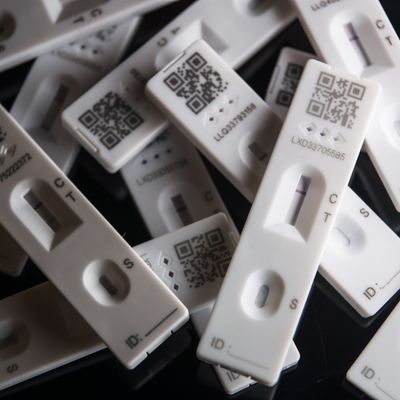
This week, The Atlantic ran a piece titled “Stop Wasting COVID Tests, People.” It argues that in light of widespread shortages, “people at the lowest risk from COVID shouldn’t buy up large stocks of at-home tests, or grab PCR appointments when they’re not experiencing symptoms.” But apparently there is a stupider version of this problem, which the piece does not address: Some people are (mis)using home COVID tests to see if tap water will produce a positive result — and posting the results on social media.
It’s unclear if the people “doing their own research” in these videos — which appeared on TikTok and Facebook, among other sites — are just looking for clicks, or if they’re genuinely concerned about the accuracy of home antigen tests, or the possibility that COVID is spreading through the water supply. But whatever their motivation, the misleading clips drummed up enough interest that several fact-checking sites felt compelled to debunk them this week.
Reuters reached out to Abbott, manufacturer of the popular Binax COVID antigen test. The company said that the videos show the tests being performed incorrectly, which renders the results meaningless. Indeed, it’s right there in the instructions for Abbott’s Binax test: “Inadequate or inappropriate sample collection, storage, and transport may yield false test results.”
But why might tap water produce false positives? Well, it’s not because our drinking supply is teeming with COVID. As PolitiFact notes, the World Health Organization, the U.S. Environmental Protection Agency, and the U.S. Centers for Disease Control have all said COVID is not transmissible thorough water. And the CDC says on its website, “Conventional water-treatment methods that use filtration and disinfection, such as those in most municipal drinking-water systems, should remove or inactivate the virus that causes COVID-19.”
According to Abbott, using anything other than the reagent included in the package can throw off the test. “Other liquids have chemical properties which can cause a chemical reaction on the test strip, resulting in misleading or inaccurate results,” company representative John Koval told Reuters.
A study published in the International Journal of Infectious Diseases in August backs this up. “We observed that all soft drinks, energy drinks, alcoholic beverages (vodka, whiskey, and brandy), commercially bottled mineral water, and carbonated mineral water caused the appearance of a red test line,” the authors wrote. “However, when equal volumes of the buffer and the respective beverages are mixed, there are no false-positive test lines.”
For those who prefer to see the tap water-COVID hypothesis debunked in the medium from whence it came, Dr. Karan Raj, a surgeon for the U.K.’s National Health Service who has over 4.5 million followers on TikTok, posted this video explaining how unauthorized liquids can throw off the test.
So to summarize, you can’t get COVID from tap water. Though the FDA recently raised concerns that home antigen tests might have reduced sensitivity against the Omicron variant, they still generally work as claimed. But you can definitely expect an extremely high false positive rate if you’re wasting COVID antigen tests on anything other than swabbing a human as directed.
More on Omicron
- What to Know About the New COVID Booster Shots
- The Dismantling of Hong Kong
- What We Know About All the Omicron Subvariants, Including BA.2.12.1






























